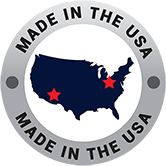Type C Thermocouples – Extreme Heat Resistance for Precision Applications
Thermocouples operate based on the Seebeck effect, a phenomenon where two different metal wires joined at one end produce an electromotive force (EMF) when exposed to a temperature difference. This voltage correlates to the temperature difference between the hot and cold junctions, allowing for accurate temperature measurement.
Type C thermocouples are specifically designed for extreme high-temperature environments, offering precision and stability where other thermocouples degrade. Their unique tungsten-rhenium composition allows them to function reliably at temperatures up to 4,200°F (2315°C), making them essential for industries requiring precise thermal monitoring in challenging conditions.
Material Composition – Why Tungsten-Rhenium?
Type C thermocouples utilize a specialized Tungsten-Rhenium (W-Re) alloy, enhancing their durability and performance:
- W-5%Re (positive leg) – Improves thermal stability and structural strength.
- W-26%Re (negative leg) – Enhances ductility and prevents brittleness at extreme temperatures.
Key Advantages:
- Unmatched heat resistance – Maintains accuracy beyond 2000°C, surpassing the limits of most thermocouples.
- High melting point – Tungsten’s melting point of 6,192°F (3422°C) makes it ideal for sustained high-temperature exposure.
- Superior electrical response – Produces a strong EMF output for precise readings.
Atmosphere Considerations – Where Type C Excels
Type C thermocouples perform optimally in controlled environments, as tungsten-rhenium alloys are susceptible to oxidation at high temperatures.
Best suited for:
- Vacuum chambers
- Inert gas atmospheres (Argon, Helium)
- Hydrogen-rich environments
Not recommended for:
- Oxygen-rich environments above 3000°F (1650°C), as oxidation can cause rapid degradation.
Industries such as aerospace, defense, semiconductor processing, and metal heat treatment depend on Type C thermocouples for their high-temperature stability.
Temperature Ranges by Wire Diameter
The operating temperature of a Type C thermocouple varies based on wire thickness:
| Wire Diameter | Temperature Range |
|---|---|
| .010″ (30 Gage) – .020″ (24 Gage) | 32°F to 4200°F (0°C to 2315°C) |
| .005″ (36 Gage) | 32°F to 3600°F (0°C to 1980°C) |
| .003″ (40 Gage) | 32°F to 3400°F (0°C to 1870°C) |
Larger wire diameters withstand higher temperatures and last longer, while smaller diameters provide faster response times but degrade more quickly.
Protective Sheaths – Essential for Longevity
To prevent oxidation and extend lifespan, Type C thermocouples require protective sheaths:
- Ceramic Sheaths (Alumina – Al₂O₃): Excellent thermal stability and high-temperature resistance.
- Metal Sheaths (Molybdenum, Tantalum, Inconel): Ideal for vacuum and inert gas conditions.
- Molybdenum & Tantalum: Best for aerospace and vacuum furnace applications.
- Inconel: Provides oxidation resistance but with lower maximum temperature limits.
Insulators & Extension Wires – Ensuring Signal Stability
For accurate readings, Type C thermocouples require high-quality insulation and reliable extension wires:
Insulation Options:
- Alumina & Hafnia – Withstands extreme heat, non-conductive.
- Magnesium Oxide (MgO) – Excellent thermal conductivity, commonly used in industrial applications.
Extension Wires:
- Fiberglass Braid – Rated up to 900°F (480°C).
- PFA/FEP Plastic Coating – Insulated for stability up to 400°F (200°C).
Best Uses & Industry Applications of Type C Thermocouples
Type C thermocouples excel in ultra-high-temperature environments where other thermocouples fail. Their precision and durability make them essential for various industries:
| Industry | Application | Why Type C? |
|---|---|---|
| Aerospace & Aviation | Jet engine testing, combustion research | Withstands extreme heat exposure during testing |
| Defense & Military | Ballistic testing, hypersonic weapon systems | Resists intense aerodynamic heating |
| Power Generation | Gas turbines, nuclear reactors | Handles extreme heat fluctuations reliably |
| Heat Treatment & Metallurgy | Vacuum furnaces, annealing, sintering | Performs well in inert gas & vacuum conditions |
| Semiconductor Manufacturing | Chemical vapor deposition (CVD), wafer processing | Ensures precise temperature control |
| Advanced Materials & Research | Superalloy testing, ceramic & refractory development | Maintains accuracy at extreme temperatures |
Cleveland Electric Laboratories (CEL) is a trusted leader in high-temperature sensor technology, providing precision, durability, and reliability across critical industries.
- ISO 9001 Certified – Commitment to consistent, high-quality manufacturing.
- AS9100D Certified – Meeting the rigorous demands of aerospace and defense.
- ISO/IEC 17025 Calibration – Ensuring accurate, traceable temperature readings.



